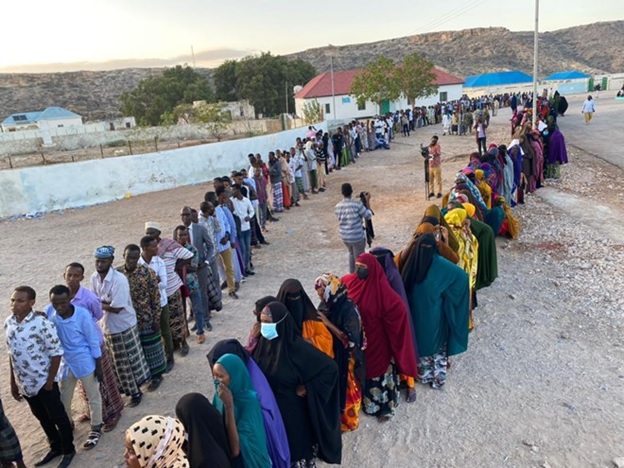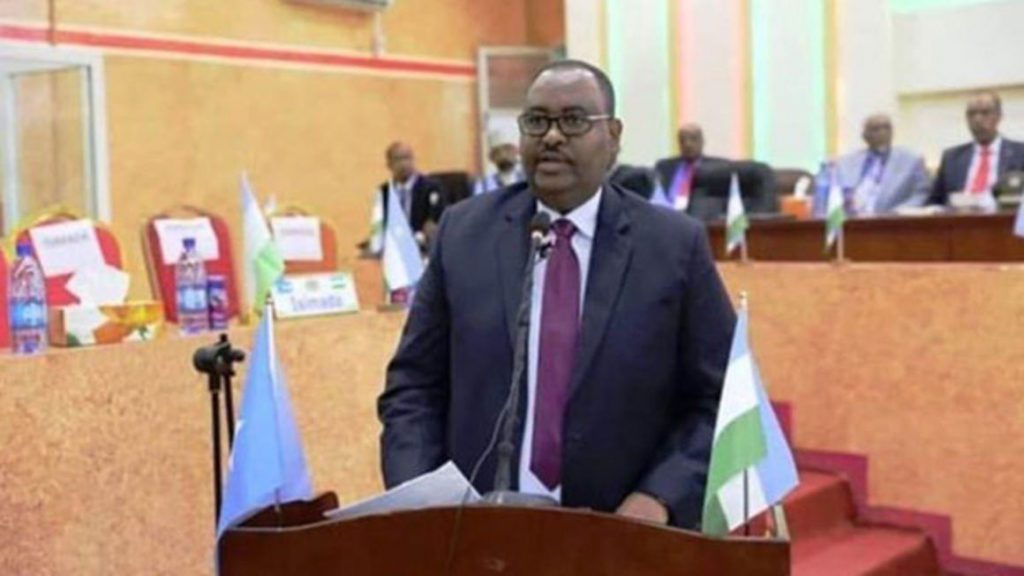By Roble Dahir
Puntland is one of the most peaceful regions in Somalia, with its people valuing law and order. A particular feature of the region is that the presidential election is held on January 8 for every five years. It is a historic day for the region. The first president, Col. Abdullahi Yusuf, tried to extend his term, and this attempt led to the region plunging into a four-year civil war that dragged back its political, economic, and social development. Therefore, discussing anything related to term extension is out of the question. Nonetheless, debates associated with how democracy can be effectively implemented are open and worthwhile. Implementation of Puntland’s democracy and popular elections would have been more practicable if the term of the implementing government had a sufficient time of more than one year.

There is confusion and ambiguity over the issue of elections, and conflicting arguments have emerged. This is not related to the constitution nor electoral law but a legitimate suspicions raised by the political stakeholders and elites that the current government intends to manipulate the 2nd phase of local elections that are now scheduled in thirty seven districts. The uproar is caused by four main factors that critics feel the current regime is strategizing to handpick three parties that could help them facilitate a term extension. These factors are:
- In the three districts where early elections were held, it took almost one year for the elected councillors to be seated, take the oath of office and elect the district leadership. This was followed by a scandal that occurred in the election of Eyl District Council Executive Members, where the government managed to handpick their preferred Mayor and Deputy in violation of the law after the government’s party was defeated in Qardho and Ufeyn.
- The officials who steered for conducting free and fair elections in the three early election districts (Qardho, Ufeyn, and Eyl), including the leadership of the Electoral Commission (TPEC), have resigned, citing government internvention of the commissions’s work and the ncapacitation of the commission by the president. The Puntland Police Commissioner, Gen. Abdi Yare, was also fired, with no reasons cited of his dismissal. This is even though the Puntland Police displayed an incredible sense of responsibility, neutrality, and non-partisanship during the entire early election period.
- The recently unfortunate action where mayors of the major cities of Puntland waiting for populr elections were replaced by appointees believed to be loyal to President Said Deni. The new appointees include his aides and inexperienced individuals who are believed to be poised to carry out the president’s instructions towards his agenda on matters relating to the planned elections.
- The scandal created by President Said Deni in managing the 48 seats of the Federal Parliament from Puntland. Many people feel that President Deni demonstrated his disregard for democracy by excluding certain competitors to stand for the election and chief clan elders from taking part in the process and denying them their political rights and roles in the election.
In fact, the voting for the representatives was done by the president’s bodyguards; a very unfortunate move . An election is an election, and one who manipulates a minor electoral process is also likely to manipulate and influence a major one for selfish interests. In the aforementioned elections at the federal level, the primary stakeholders are the traditional elders of the communities, who are highly respected and recognized as a pillar of unity and solidarity of the Puntland people. However, they were often locked out and conspicuously not engaged in the process. Only the president and his junior ministerial clerks managed the process, which is considered by many to be a dark chapter in Puntland’s recent history.

The rational question now is: how can a regime that failed to manage 48 seats based on indirect election be trusted to manage the one-person, one-vote elections of almost 1100 seats in State Parliament and District Councils? Another question worth asking is: does HE. Said Deni wants to leave a legacy and hold free and fair elections, or does he want to hold an election that he wins at whatever cost? I assume a majority of the political elite believe it to be the latter. Is the other question worth contemplating is: why has the Puntland President politicized the Supreme Court, which the Parliament rejected to approve in its several sessions? All parties and stakeholders must trust the Puntland court, hence the need to have a trustworthy Chief of Justice and Judges. This key officeholder must be nominated to create a conducive environment to process an applicable pattern of democracy for the Puntland elections.
Here, I will emphasize my proposal to promote the democratic process in Puntland, which I trust will enhance its people’s unity, political stability, and solidarity. Elections must be held through a process that is satisfactory to all stakeholders. One of the paramount steps that ought to be taken is to immediately establish primary bodies for creating trust and addressing legal debates, such as the Constitutional Court, Boundaries Commission, and others that are necessary. The demarcations recently presented by the Ministry of Interior can elicit some controversies which may require public debate. Hence, if the Puntland elections fail again, it is a disgrace, non-strategic, and unwarranted mistake that will frustrate not only the citizens but also the international community that invested hugely in terms of resources to ensure free and fair elections. These elections are essential for good governance, enhanced security, better social services, economic growth, and peace as well as providing lessons for Somalia’s bigger processing of democracy. Additionally, if the Puntland electoral process flops, that may destroy social cohesion and consequently weaken Puntland stance on the national political affairs in the State-building process, federalization, and related engagements.
The mandate of the current regime ends in one year and time is short. The recommendations and pieces of advice I would contribute to today’s political context of Puntland include:
1. The Transitional Puntland Electoral Commission (TPEC) should be empowered through the initiation of the remaining regulations (if any) and the establishment of the necessary bodies. Also, there should be a provision for massive civic education, registration of voters for the 37 districts, selection of polling stations, and training of their staff for conducting credible, free, and fair processes. Popular elections should then commence after January 2024.
2. The next presidential election should take place through the traditional parliamentary selection. The new government ought to declare earlier elections for the parliamentarians alongside municipal elections. This will enable the compilation of the election of councils. Further, it will enable the political parties to have full confidence to participate fully in the main elections because there will be no fear of rigging as a newly elected administration is leading the process.
3. In the meantime, all legal conflicts in the electoral context and process should be solved. This is achievable through the establishment of the constitutional court and amendment of Municipal Election Laws and all necessary regulations to have them fully enacted and ultimately build a solid electoral infrastructure.
It would be damaging to Puntland’s security and political stability to proceed with a potentially skewed electoral process whose results are bound to be disputed. Instead, the government must establish a strong election infrastructure by specifically addressing the legal questions. Then, the electoral process could be implemented well as long as the implementing government has adequate time, effective legal bodies, and established regulations. For a successful electoral process, Puntland ought to leverage the remaining year to enable proper planning of the process and go for the necessary reviews before the commencement of the process.
Roble Dahir
Researcher/ State/Peace-building Analyst
Email: [email protected]
—————-
Related articles
- Wargeys yar baan waa hore ka akhriyay WQ Khalill C/raxmaan X. Xasan
- Elections in Puntland show the collective commitment of its people to peace and democracy
By Dr Aweys Omar - Is Puntland on the right path to achieve founding principles of 1998 By Amed A Isse
- Legitimizing the status quo in Puntland is not democratization By Mohamed I Mohamed (Siibad)
We welcome the submission of all articles for possible publication on WardheerNews.com. WardheerNews will only consider articles sent exclusively. Please email your article today . Opinions expressed in this article are those of the author and do not necessarily reflect the views of WardheerNews.
WardheerNew’s tolerance platform is engaging with diversity of opinion, political ideology and self-expression. Tolerance is a necessary ingredient for creativity and civility.Tolerance fuels tenacity and audacity.
WardheerNews waxay tixgelin gaara siinaysaa maqaaladaha sida gaarka ah loogu soo diro ee aan lagu daabicin goobo kale. Maqaalkani wuxuu ka turjumayaa aragtida Qoraaga loomana fasiran karo tan WardheerNews.
Copyright © 2024 WardheerNews, All rights reserved


